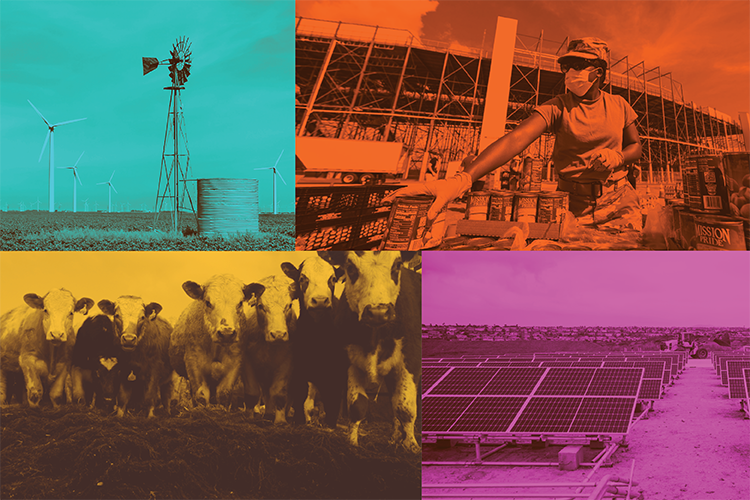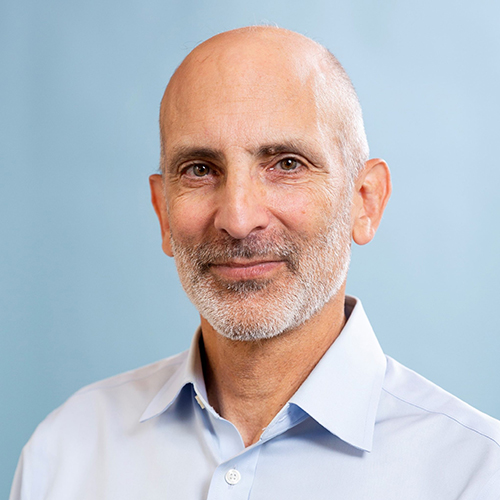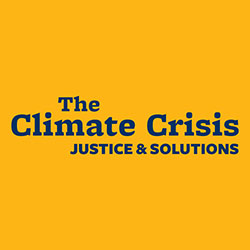‘Climate Break’: A podcast focused on solutions to the climate crisis
In bite-sized episodes, this weekly podcast by UC Berkeley’s Center for Law, Energy and Environment steers away from climate doom and zeros in on what can be done
May 30, 2023

A weekly podcast by UC Berkeley’s Center for Law, Energy and Environment, Climate Break steers away from climate doom and zeros in on what can be done. (UC Berkeley graphic by Neil Freese)
Climate change is a huge topic and a huge force in our lives. That’s why in 2020 UC Berkeley’s Center for Law, Energy and Environment (CLEE) started Climate Break, a podcast that offers solutions to the climate crisis in bite-sized weekly episodes. Climate Break broadcasts three times a week on KALW pubic radio and is available on all major podcast apps.
In this Q&A, Berkeley News talks with the creators of Climate Break — Ethan Elkind, director of the center’s climate program and host of the podcast, and Ken Alex, director of Project Climate and a producer of the podcast — about the show and why they started it.
Berkeley News: Why did you decide to make Climate Break?
Ken Alex: One of the biggest challenges with climate is always getting people to take action, to be interested, to find different ways to talk about it to different audiences. And one thing that we’ve talked about at CLEE is that a lot of the coverage around climate change, unfortunately for obvious reasons, is pretty negative. You know, the series of horribles that are coming down the pike and are already here, to some extent.

Ken Alex is director of Project Climate, part of Berkeley Law’s Center for Law, Energy and Environment (CLEE), and a producer of the Climate Break podcast. (Berkeley Law photo)
So, my thought was, “Can we try something with a different tone that would really just focus on solutions?” And then, in talking about it with Ethan and others, we also thought that doing short clips instead of really going into depth or smashing people over the head with it, just to have these kind of short teasers, to give people an idea, to give them some hope and to have a lot of solutions, which in our experience, there are a ton.
Ethan Elkind: Yes, I would describe the show as sort of an antidote to despair. Hopefully, it empowers people and shows them that there are a ton of important climate solutions out there, some of which they can adopt in their own lives, and perhaps more importantly, that they can support at a societal scale. And to just show to people all the great work that’s being done out there and all the innovation that the climate challenge is unleashing. And a lot of that is happening right here at UC Berkeley. It was actually pretty surprising to us just how much amazing work is happening all across campus in corners that we at the law school didn’t even know existed. So, it has been fun to feature some of that work on the show.
How do you find all of these experts on campus working on climate solutions?
Ken Alex: One thing sort of leads to another. You find one person working on something, and they say, “Oh, do you know this person’s work?” There’s also the Berkeley Climate Change Network run by Bruce Riordan, who compiles all the climate work going on, which is surprisingly hard to figure out. And then, a lot of Climate Break is run by students, and they bring us ideas all the time — some of them are from the students’ own professors. The number and diversity of projects and solutions just at UC Berkeley is amazing. And then, if you expand it beyond that to the Bay Area, California and beyond, it’s virtually endless.

Ethan Elkind is director of CLEE’s climate program and host of Climate Break. (Berkeley Law photo)
Ethan Elkind: The Berkeley Climate Change Network is an effort to kind of knit together all the different climate work happening on campus, so that definitely helps. But Ken also has a lot of contacts and experience working in this field, first for the attorney general’s office, where he ran the environmental law section, and then advising [former Gov.] Jerry Brown as a senior climate adviser and director of the Governor’s Office of Planning and Research. And I’ve been at this work for over a decade and a half. So, we started with a pretty good idea of who is doing what.
But I would also really credit the students. We’re almost entirely student-staffed. CLEE senior fellow Chandra Middleton takes the lead in overseeing them, and Ken and I help, but we’ve got students from the journalism school, the law school, business school and a great group of undergraduates who have been really innovative and investigative about finding the great research that’s being done on campus and outside of campus, as well. So, they really take the lead.
In listening to some of Climate Break’s episodes, which run less than two minutes each, I found myself wanting to know more about many of the topics. How have audiences responded to the format?
Ethan Elkind: The feedback we’ve gotten has been very positive. I’ve been surprised — you can actually fit a fair amount of information in less than two minutes. It’s a nice way to get people’s attention and then encourage them to dig deeper if they’re interested in getting more involved.
Also, we’ve now partnered with KALW radio, an NPR affiliate in San Francisco, which broadcasts the show twice every Thursday and once on Sunday morning. It’s also available on the NPR One podcast app, which allows listeners to stream local NPR stations live. Our goal is to get the show distributed on more radio stations around the country, not just through digital distribution. Less than two minutes is a good length to fit between longer hourlong radio programs on public radio, in particular.
What are a few of your favorite episodes?
Ken Alex: We’ve done some based on community work, some based on really hard science. Some of them are on more sociological kinds of things. One that comes to mind is about using oyster shells to create a seawall. We interviewed someone who has been big on corporate activism about how tech companies, for example, can encourage their leadership to lobby for climate policy and take more of a stance on climate policy. It’s just a range of stuff, from technology to community activism to some of the interesting research going on in the sciences, in general, and agriculture, everything.

An ongoing Berkeley News series examines how the campus community is confronting the climate crisis.
Ethan Elkind: We’ve done a couple focused on the Bay Area. One was with an environmental justice activist from West Oakland, Ms. Margaret Gordon, who talked about the work she’s been doing to monitor toxic air pollution, which is really co-pollution along with greenhouse gas emissions, in her community. That was a real standout.
We interviewed a researcher at UC Davis who is developing a method to feed seaweed additives to cows to reduce their methane gasses, which is really interesting and promising. We interviewed a Berkeley professor, Whendee Silver, who has been experimenting with soil management on ranches and ways to use grasslands to capture carbon, so that’s fascinating.
Another Berkeley researcher is looking at fiber optic cables to better monitor offshore wind developments and make sure that offshore wind is producing optimally. There’s another researcher on campus doing electric vehicle charging that can optimize to support the grid to encourage people to charge when we have plenty of electricity available and not when it’s constrained. I could go on and on, it’s all pretty fascinating stuff.
One thing that we’ve talked about at Berkeley News is how many solutions there are, but how few of them are being implemented. Do your guests ever discuss how to apply these solutions to the climate crisis?
Ken Alex: We do longer-form podcast episodes, which we call Climate 101, to kind of dig into some issues. In fact, we are intending on doing one about the barriers to implementation. A lot of work that CLEE does outside of the podcast world is really about exactly that set of problems.
Ethan has spent the last dozen years working on reports that focus very much on, “Here’s the issue, here are the barriers to getting action and here are some of the solutions.” And my project — Project Climate — is laser-focused on the implementation piece because, as you just identified, there are all these solutions, but each one of them has their own set of challenges to get to fruition. And so, given the speed of climate change and our need to act quickly, that’s really been a lot of our focus.
Ethan Elkind: And we do always ask our guests, “What are the challenges to getting this solution implemented or to scale up?” We want to leave listeners with the next steps that have to happen. Maybe it’s companies or policymakers at the local or state or federal level doing something, or sometimes individual action, as well. Implementation is always a big challenge. We actually have an episode about how to communicate better on climate change, how to communicate climate science, particularly to folks who are not typically receptive to those messages.
What were some of the ideas that came from that episode? What are some effective ways to communicate solutions to climate change to people who normally aren’t receptive to these messages?
Ethan Elkind: It’s mostly about framing — how to frame the issue not using language that would immediately get people riled up, but talking about shared values and co-benefits.
Ken Alex: Two of the biggest elements are around meeting people where they are and acknowledging different perspectives. The more “place-based” the discussion of climate impacts and solutions, the more they are relevant to people’s lives. People also experience climate impacts differently and have different views about what is caused by climate change and what may just be annual variability. It’s fine to recognize different views and perspectives.
Where do you want to see Climate Break in five years? What kind of impact do you hope it has?
Ethan Elkind: One of the goals we have is to reach audiences who typically aren’t that engaged on climate change. In places like the Bay Area, it’s generally understood by most people what’s happening with climate change, and there’s more support for climate action, in general. But there’s always more that can be done. So, we definitely want to communicate with those audiences.
There are a lot of fascinating solutions out there that bring a lot of co-benefits, can improve people’s lives and are something that people can adopt at a larger scale that doesn’t involve sacrifice — certainly not as much sacrifice as doing nothing and letting climate change happen unabated.
So, that’s really one of our goals — to reach audiences that don’t otherwise hear about these solutions. And even for someone like me, who works in this field, I’m learning a ton in these interviews. There’s just so much that we can all learn from.
Ken Alex: The other thing is to get some air time for some of the folks who are working in some obscurity on some amazing things. That’s been one of the most fascinating — you find somebody in some lab somewhere who is doing something around taking CO2 out of ocean water. Who would have even thought of that, let alone somebody who thinks that there’s actually a way to do it?